Next story: Jam in the Valley
Reaching for the American Dream
by Kellie Coppola
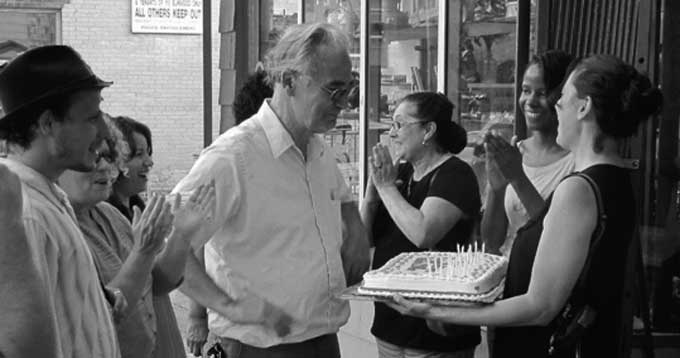
Newer residents enriching our city
The Fourth of July is our most red-blooded American holiday. The Yankees are playing, barbecue pits will be fired up and the night is sure to be capped with spectacular fireworks displays from coast to coast. It’s a celebration of American freedom and the commitment to life, liberty and the pursuit of happiness. It’s that very notion that has brought millions of immigrants here and as a result the pursuit of happiness for many Americans now includes eating tandoori chicken, drinking Ethiopian coffee, salsa dancing or wearing a batik dress. We have clearly moved beyond Italian Festivals or St. Patrick’s Day parades being the only evidence of immigration. Buffalo, for example, offers a plethora of ethnic restaurants and shops run by people from all parts of the world. I visited a few of these shops to find out what they contribute to our culture and what challenges they face.
SUN RESTAURANT 1989 Niagara St. (suncuisines.com)
Chef Kevin Lin, who is from Burma, owns the very popular Sun Restaurant, which specializes in black rice sushi, Burmese, Thai, Korean and other asian dishes. Kevin came to came to the U.S. in 1996 after his wife Stephanie won a visa through the American government’s visa lottery. The couple arrived in Buffalo in 1997 when Kevin won a subcontract to provide sushi for Wegmans supermarkets.
“I did supermarket sushi for 17 years,” said Kevin, “right up until last year. I opened Sun five years ago while still running the Wegmans sushi business because working in the supermarket I don’t own anything. You can lose your business with 60 days notice if the supermarket decides to end it. I wanted to have job security for life.”
Using your life savings to start a business can be very risky but Kevin was fearless.
“I always had confidence that I could be successful,” he said. “When I was 20 back in Burma I ran a menswear warehouse that was very successful, so I know how to build a business. But you can’t grow enough in Burma so I went to Japan to be an employee for five years. I started out as a dishwasher, worked in a Korean BBQ place, then learned to make sushi as assistant chef.” Unfortunately, if you’re not native Japanese you won’t get beyond assistant chef in Japan so the couple jumped at the chance to come to the U.S.
“America makes everything possible. I love that,” said Kevin. “I can compare three countries I’ve lived in and they are all totally different. In Burma you will never own your own car, you will never own your own house, it’s very difficult. You will work and save for maybe 50 years and you will own one car. In Japan, very nice country, but it’s the same thing, very hard to own your own house, very hard to build your own life. When we arrived to America we were very, very happy because I have an entrepreneurial mind and this the place to be. You can work here and own a car within a year, you can own a house within five years–and that’s easy to do in Buffalo. I came to the United States in 1996; I owned my first car in 1997 and I bought a house in 2003. Yes, the United States is much different than any other country.”
Kevin said he enjoys making customers happy and providing delicious food. He’s very good at both.
EL BUEN AMIGO 114 Elmwood Ave, Buffalo (elbuenamigo.net)
Very few people can match Satiago Mansferrer’s life story. The man behind El Buen Amigo has been helping people all his life, something that landed him in prison in his home country of Chile and brought him again to prison in the U.S., this time teaching inmates. (For a fascinating and detailed account of Santiago read Aaron Lowinger’s excellent piece in The Public goo.gl/i6qOBH.)
“El Buen Amigo has things that no one else has,” Santiago Mansferrer said, as he gave a tour of his store. Each item in the nonprofit shop in the Allentown district is handmade by people from several countries in the Caribbean, Central and South America. Santiago pointed to pictures of families to show who crafted a particular piece, connecting to it a face and a story.
“Here we present the beautiful faces of hardworking people,” he said. El Buen Amigo provides a direct market for these artisans to sell their goods. “We support them: they work, we support”
With gentle honesty, Mansferrer explained that it’s tough running a volunteer-based establishment. In addition to his own connections Santiago enlists college students or travelers that go abroad to establish connections with artisans and bring back work to sell. Money raised selling their goods goes directly to the artisans that made them and Santiago said he wishes his store could support even more craftspeople.
“The market is our boss. The market is the people. If it doesn’t sell, we can’t keep bringing it back here.” Mansferrer said.
Santiago Mansferrer is a humble man who hesitant to talk about himself, “this story isn’t about me, that’s not important. It’s about the Latin American people.”
El Buen Amigo also has Spanish classes and hosts films and other events.
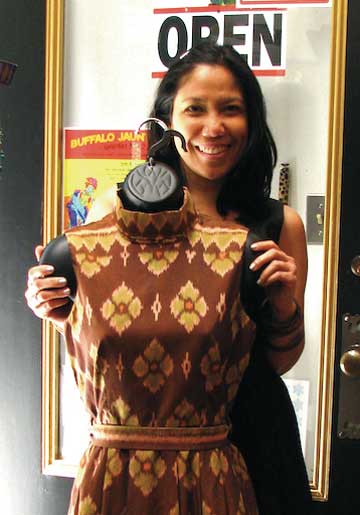
SASMITA BATIC 617 Main St, Buffalo (sasmitabatik.com)
Novi Paluch is the proprietor of Sasmita Batik Indonesia, a quaint and colorful store in the Market Arcade Building that sells Indonesian jewelry and handmade batik designs, many of which she designed herself.
“In Indonesia, we love batik because it’s part of our culture,” Paluch said. “Every Friday in offices all over Indonesia, we wear batik.”
A former trader on the Indonesian Stock Exchange, Nove had a bit of a culture shock in 2008 when she arrived in Buffalo with her American husband.
“Because my English wasn’t good there was a lot of miscommunication and our traditions are different,” Novi said with a chuckle. “If a meeting is at 11, he shows up at 11. I show up at 12 because it’s common culture in Indonesia: time is different.”
Novi says she feels a responsibility to her cultural roots while running her business, which has been positively received by the community. She is planning an event in the near future to showcase all aspects of Indonesian culture.
A graduate of a University of Buffalo Entrepreneurship program, Paluch explained that someday she would like to go back to Indonesia and teach better business practices to Indonesians.
“In Indonesia, to start a business you set up a table and you’re done,” Paluch said. “I’d like to teach them the right way. That’s my dream.”
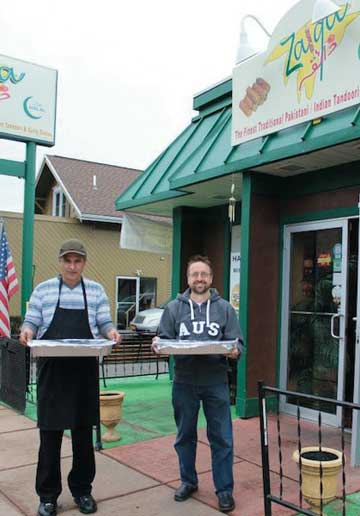
ZAIQA 3054 Delaware Ave, Kenmore
Masud Qazi has worked tirelessly to prepare authentic Pakistani cuisine at his restaurant Zaiqa at 3054 Delaware Ave in Kenmore.
“Pakistani food uses a lot of spices, and is very healthy,” Qazi explained. “We get everything locally. Everything we make is freshly bought and freshly prepared.”
The menu includes everything from traditional dishes like Chicken Karahi to fried chicken for those less adventurous. Qazi said that his restaurant attracts people from all over, some trying something new, and some nostalgic for the taste of home. When he opened, the location was his biggest obstacle.
“I was a challenge and I took it,” Qazi said. “In two years, two businesses closed here. I’m here four years and I went through hard financial situations, but I didn’t quit.”
Qazi said that innovation contributed to his success. “We are the only Pakistani restaurants in the world with a drive-thru. I’m constantly trying to come up with new things” Qazi explains.
Qazi said the community of Pakistani’s in Buffalo is small, and many of them are in professional fields. He revels in the fact that he can bring them food authentic to their culture and share it with the Buffalo community. He also donates food and gives to those who can’t afford it.
“Pakistani’s are very kind people,” Qazi maintained. “We do a lot of charity.”
Qazi said that he’s driven by his own definition of success: “Success is when people eat my food and leave with a smile on their faces because they enjoyed it.”
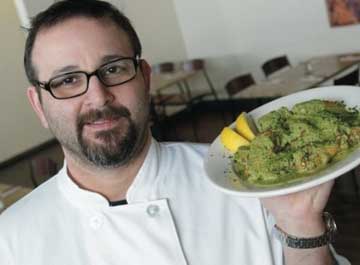
FALAFEL BAR 3047 Sheridan Dr or Fables Café in Downtown Library 1 Lafayette Sq. (thefalafelbar.com)
Israeli native Oded Rauvenpoor, owner of Falafel Bar is committed to serving a Middle Eastern rendition of Mediterranean cuisine. Oded believes there are several interpretations of Mediterranean cuisine and describes his Israeli cuisine as a “new taste” to Buffalo, as “newer, more modern.”
Pretty much everything is made from scratch, “the old fashioned way,” and purchased from local vendors.
“We are for everybody,” Oded said proudly about his inclusivity. He employs many refugees from Vive La Casa, a refugee center on 50 Wyoming Ave.
“Today the world is cruel,” he explained. “Today we try to live and work together.”
As a business owner, Oded’s journey wasn’t easy. He was at first hesitant to introduce his culture into Buffalo’s palette.
“We weren’t sure that we could serve Middle Eastern food, so we started off as more Greek” Oded explained. “But we realized that people liked the Middle Eastern dishes more and so we kept with it.”
Oded’s cuisine has recently extended to Fables Café at 1 Lafayette Square, Buffalo.
Fables manager Leah Wiseman said she has known Oded long before they went into business together. “The food isn’t from recipe books” she said, “it has been passed down from generation to generation.”
“The Israeli community is passionate about everything they do,” Leah said, “So we want to serve Middle Eastern food with the same amount of passion.”
WEST SIDE BAZAAR 25 Grant St Buffalo
The West Side Bazaar at 25 Grant St houses 13 booths run by newly immigrated vendors looking to share their culture while earning a living. Here, without budgeting for airfare and a hotel one can munch on authentic Japani Samosas and purchase a Rwandan peace basket.
“It’s nice because of its low commitment,” said Emily Brady, a regular customer of the Bazaar. “Instead of sitting down at one restaurant, you can sample different foods from each booth.”
Nadeem Yousef, owner of Macramé by Nadeen, was born in Iraq and has been in the United States for seven months.
“I had family here,” Yousef said. “It’s really hard for people that don’t.”
Yousef also said that she has received help from the surrounding community to navigate her new home, helping her with applications and enrolling her kids in school. Of her seven months in the United States, Yousef has operated her booth for three, where she sells macramé, an art she learned in Iraq.
“It was hard here at first because I barely spoke English,” said the vendor. “Here [at the Bazaar] everyone has a different dialect. But we are family,” Nadeem said. “We take care of each other”
Aster Mekonnen, owner of the Ethiopian Coffee Ceremony, shared the sentiment. Mekonnen practices the specific Ethiopian coffee making process and sells different types of clothing central to her culture.
As with many vendors of the Bazaar, Mekonnen hopes to someday move beyond the Grant Street establishment.
“I would like to open up a coffee house one day,” the vendor said, “that would be my success.”
Despite a difficult transition, Aster said she is happy to be here for her kids so they can go to school. “I took them to see Ethiopia and they are really happy to be Americans.” Aster said, smiling.
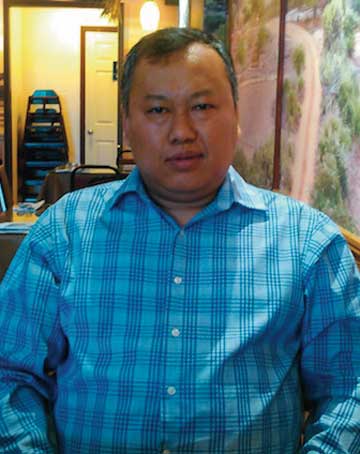
LIN RESTAURANT 927 Tonawanda St
Last but not least, Lin Restaurant is owned by Khin Maung Soe, a man from Burma who Chris DelPrince, Khin’s financial consultant, describes as “the Russ Salvatore of Buffalo’s Burmese community.”
Khin Maung Soe’s story revolves around striving for success by serving delicious, traditional Burmese food to the surrounding community, while picking up the broken pieces of his own life. In Burma the government took his house and Khin and his family spent time in a refugee camp before coming to the United States, escaping a life of fending for themselves, fear and the inability to question the government.
Khin found a community in Buffalo that helped him adjust to America and grow his asian grocery market business. Locals taught him English and he learned about American culture from attending community meetings.
He hopes to recreate this kind of community amongst the Burmese community in Buffalo, a lofty challenge considering immigrant communities often bring their political and ethnic differences with them.
“The military in Burma caused a lot of mistrust, a lot of hate.” The restaurant owner explained. “I try to make that better and bring all of the ethnic cultures together.”
“I wanted to move to Grant Street [from the former restaurant location] because many people live around here and it was good for business” Soe said.
According to Soe, there are eight ethnic groups and that sometimes causes problems. He serves as a negotiator, especially in regards to the annual Burmese Water Festival, in which a few groups choose not to participate. In October 2016, he plans on holding an event he hopes will join all sects of the Burmese community, but didn’t reveal specifics.
Bud Hirsch, Khin’s neighbor, experienced the kindness of Soe’s family and has become an advocate for the restaurant.
“I share a garden with his family” Hirsch said, “Khin’s nephew offered to wheel me into the restaurant. I was leery, but didn’t have an excuse not to, so I did.”
Once Hirsch got past his skepticism, he was blown away. “The food is amazing and so fresh. Khin and his family were so willing to share their culture... but I can’t just tell you about it, you have to experience it for yourself.”
“I think people are so skeptical of cultures because they’re different” Hirsch asserts. “Buffalo’s the city of good neighbors. I would like to see us live up to that.”
As we celebrate all things American on July 4th, let’s remember our ethnic communities enrich us and open our eyes to new cultures and traditions. Happy 4th.
blog comments powered by Disqus
|
Issue Navigation> Issue Index > v14n26 (Week of Thursday, July 2) > Reaching for the American Dream This Week's Issue • Artvoice Daily • Artvoice TV • Events Calendar • Classifieds |









 Current Issue
Current Issue